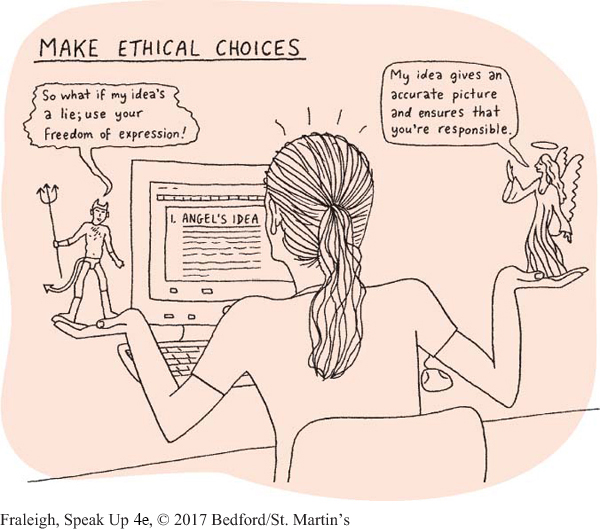A Focus on Free and Ethical Communication
Public speaking also involves careful consideration of the rights and responsibilities that come into play when individuals are free to express their ideas in a public forum. Freedom of expression—the right to share one’s ideas and opinions free from government censorship—

28
29
Although you are guaranteed the right to express your ideas freely, as a public speaker you also have a responsibility to express your ideas ethically. Ethics refers to a group’s shared beliefs about what behaviors are correct or incorrect. Protecting freedom of expression and encouraging the ethical use of that right are increasingly important concerns in the field of public discourse. The principles endorsed by the National Communication Association include the following:
“We advocate truthfulness, accuracy, honesty, and reason as essential to the integrity of communication.”
“We endorse freedom of expression, diversity of perspective, and tolerance of dissent to achieve the informed and responsible decision making fundamental to a civil society.”42
Concerns about free expression and ethics are not a new consideration in public speaking. In the first century CE, the Roman rhetorician Quintilian argued that parents and teachers should strive to produce “the good person speaking well.” That is, communicators should be virtuous, moral, and focused on the public good, in addition to being effective orators.43 Today, as unethical communication has increased in the United States, people have stepped up their demands for ethical public speaking. Americans are tired of politicians, lawyers, and multimillionaire chief executive officers who blatantly lie to the public. Recent polling indicates that a majority of Americans no longer have a high level of trust in a wide range of institutions—
Consequently, ethics have begun playing an increasingly prominent role in the study of communication as well as other disciplines. As it turns out, there’s far more to public speaking than just presenting your message in a way that induces your audience to agree with you and take the actions you have advocated. You must also treat your listeners ethically. That means telling the truth, helping your audience make a well-